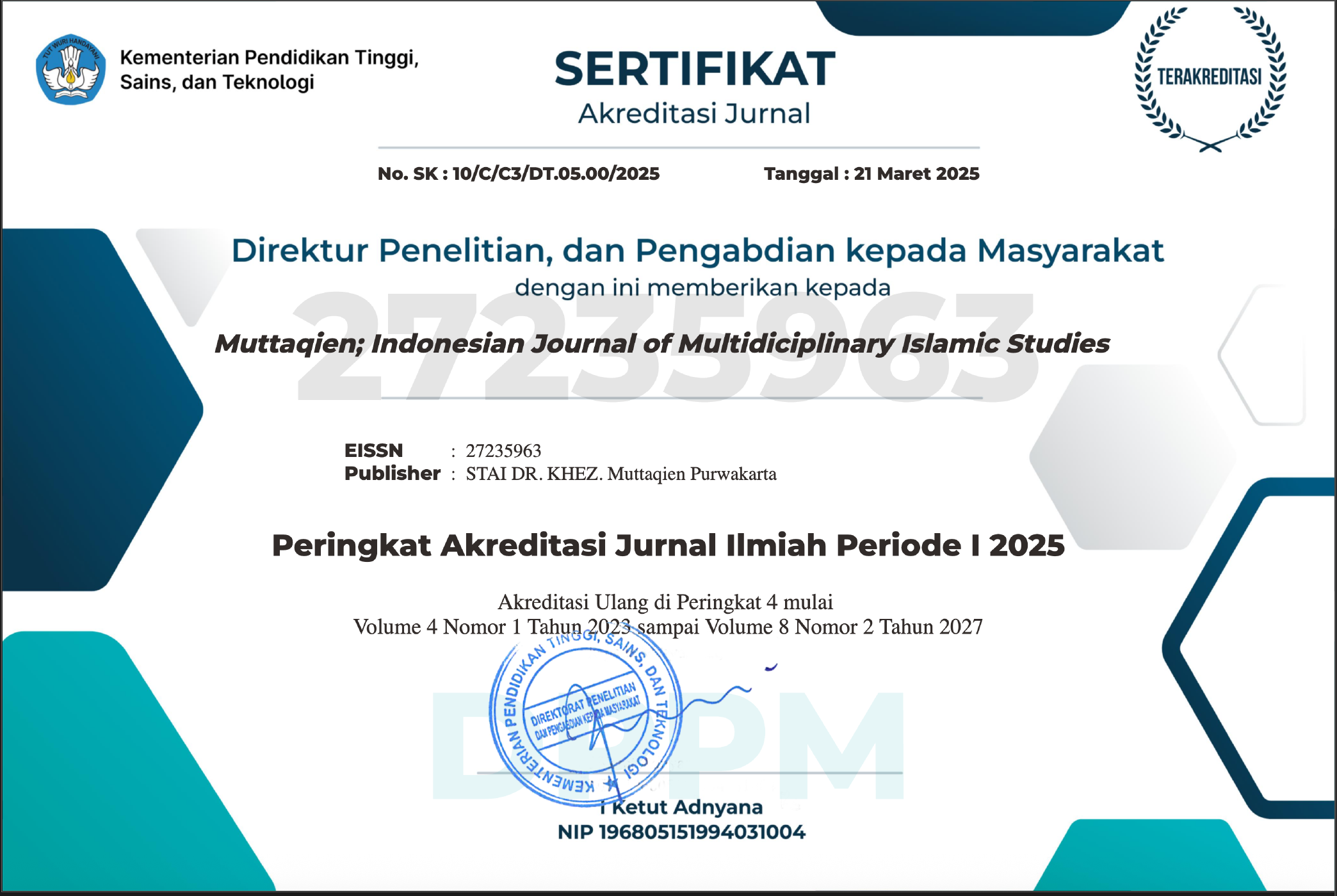أصول المبادئ التربوية الإسلامية من منظور القرآن الكريم: دراسة نظرية تطبيقية على التربية الإسلامية
Keywords:
Principle, Islamic Education, Quranic PerspectiveAbstract
Islamic education is a conscious and directed process aimed at developing human potential comprehensively, based on the Qur'an and Hadith. Unlike general education, which focuses on the cognitive dimension, Islamic education strives to balance intellectual, spiritual, and moral aspects. This study aims to investigate the influence of appropriate educational methodology on the success of Islamic education. The method used is an in-depth literature analysis of various Islamic education sources. The results show that applying an integrated educational method, which combines classical and contextual approaches based on the values of the Qur'an and Sunnah, is effective in shaping students' character in terms of beliefs and behavior. Furthermore, teachers who understand the basic principles of Islamic education can create a more in-depth and influential learning environment. This study recommends that the selection of appropriate methodology should be seen as a key to achieving the goals of comprehensive Islamic education, which encompasses thought, faith, and action. Thus, improvements in Islamic educational methodology are crucial for improving the quality of education and fostering character that aligns with Islamic values.
References
طنطاوي، محمد سيد. (1998 م). التفسير الوسيط للقرآن الكريم، القاهرة: دار نهضة.
المراغي، أحمد مصطفى. (1974 م). تفسير المراغي، القاهرة: ملتزم الطبع والنشر.
بدوي، عبد الرحمن. (1977 م)، مناهج البحث العلمي، الكويت: وكالة المطبوعة.
وهيب، البخاري بن إبراهيم. (2006م). مبدأ الظفر بالحق. رسالة ماجستير غير منشورة. الجامعة الأمريكية. القاهرة: 2006م.
مصطفى، إبراهيم، وآخرون. (1980 م). المعجم الوسيط، القاهرة: دار الدعوة.
الأصفهاني، الراغب. (2008 م). المفردات في غريب القرآن، حققه محمد سيد كيلاني. لبنان: دار المعرفة.
خياط، محمد بن جميل، (2011 م). النظرية التربوية في الإسلام. مكة المكرمة: طابع الصفا.
الشحود، علي بن نايف. (2009 م). الخلاصة في أصول التربية الإسلامية. ماليزيا: دار المعمور.
النقيب، عبد الرحمن عبد الرحمن. (2007 م). كيف نعلم أوالدنا الإسلام بطريقة صحيحة، القاهرة: دار السالم.
محمود، علي عبد الحليم. (1995 م). التربية الروحية، القاهرة: دار التوزيع والنشر الإسلامية.
علي، سعيد إسماعيل. (2010 م). مدخل إلى التربية الإسلامية، القاهرة: دار الفكر العربي.
قطب، سيد. (1992 م). في ظالل القرآن، بير وت: دار الشروق.
دراز، محمـــد عبـــد الله. (2005 م). النبـــأ العظـــيم نظـــرات جديـــدة فـــي القـــرآن، الكويت: دار القلم للنشر والتوزيع.
الجيوسي، محمد عبد الله. (2006 م). التعبير القرآني والداللة النفسية، دمشق: دار الغوثاني للدراسات القرآنية.
ابن كثير. (1998 م). تفسير القرآن العظيم، بيروت: دار الكتب العلمية.
ابن الجوزي، (2001 م). زاد المسير في علم التفسير، بيروت: دار الكتاب العربي.
الزركشي، (1994 م). البحر المحيط في أصول الفقه، القاهرة: دار الكتبي.
ابن منظور. (1994 م). لسان العرب، بيروت: دار صادر.
John Creswell. (2014). Research Design: Qualitative, Quantitative, and Mixed Methods. California: Sage Publications.
Mary George. (2008). The Elements of Library Research. New Jersey: Princeton University Press.
Hoktaviandri. (2017). Mengenal Pendidikan Keimanan dalam Al Quran. Tarbawiyah, Jurnal Ilmiah Pendidikan. Vol. 01 No.1. 125-146. https://e-journal.metrouniv.ac.id/tarbawiyah/article/view/973/814
Kusuma, Ade Reza. (2022). Konsep Jiwa Menurut Ibnu Sina dan Aristoteles. Tasamuh: Jurnal Studi Islam. Volume 14, Nomor 1, April 2022, 61 – 89. https://e-jurnal.iainsorong.ac.id/index.php/Tasamuh/article/download/492/469/1725
Miskahuddin. (2019). Manusia dan Lingkungan Hidup Dalam Al Quran. Jurnal Ilmiyah Al Mu’ashirah: Media Kajian Al-Quran dan Al-Hadits Multi Perspektif. Vol. 16, No. 2 (2019), 210-227. https://jurnal.ar-raniry.ac.id/index.php/almuashirah/article/view/6569
Suriadi Samsuri. (2020). Hakikat Fitrah Manusia dalam Islam. Al Islah: Jurnal Pendidikan Islam. Vol. 20 No. 1 (2022). 86-93. https://ejurnal.iainpare.ac.id/index.php/alislah/article/view/1278
Aswandi. Al Wizar. (2024). Belajar dan Mengajar dalam Perspektif Al-Qur’an. Hamalatul Qur’an: Jurnal Ilmu-Ilmu Al-Qur’an. Volume 5 Issue 2 2024, 54-65. https://jogoroto.org/index.php/hq/article/view/153
Asrori. (2017). Pendidikan Dalam Perspektif Islam. Hikmah: Journal Of Islamic Studies. Vol. XIII, No. 2, 2017. 161-176. https://journal.alhikmahjkt.ac.id/index.php/HIKMAH/article/view/158
Published
How to Cite
Issue
Section
Copyright (c) 2025 Muhammad Azkia Fahmi, Irfan Anshori, Nurrohman Nurrohman, Mamduh Hilmi

This work is licensed under a Creative Commons Attribution-ShareAlike 4.0 International License.
Muttaqien; Indonesian Journal of Multidiciplinary Islamic Studies allow the author(s) to hold the copyright without restrictions and allow the author(s) to retain publishing rights without restrictions and authors who publish with this journal agree to the following terms:
In developing strategy and setting priorities, Muttaqien; Indonesian Journal of Multidiciplinary Islamic Studies recognize that free access is better than priced access, libre access is better than free access, and libre under CC-BY-SA or the equivalent is better than libre under more restrictive open licenses. We should achieve what we can when we can. We should not delay achieving free in order to achieve libre, and we should not stop with free when we can achieve libre.
Muttaqien; Indonesian Journal of Multidiciplinary Islamic Studies has a CC-BY SA license or its equivalent as the optimal license for publication, distribution, use and reuse of scientific work. This license is under a Creative Commons Attribution 4.0 International License.
You are free to:
- Share — copy and redistribute the material in any medium or format
- Adapt — remix, transform, and build upon the material for any purpose, even commercially.
- The licensor cannot revoke these freedoms as long as you follow the license terms.











